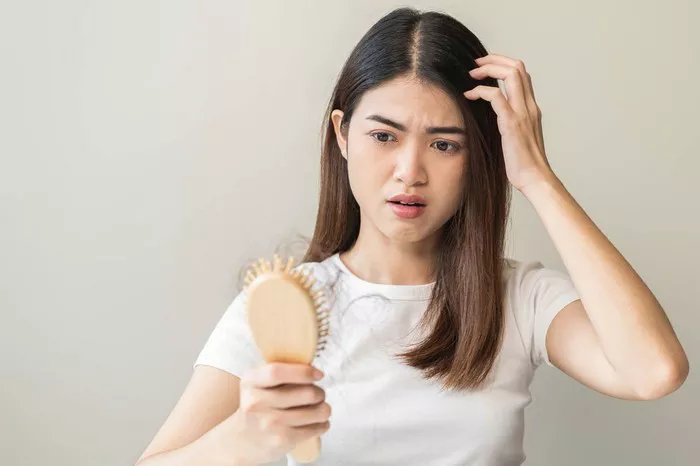Hair fall in women is a common concern that can be attributed to various factors such as hormonal changes, nutritional deficiencies, stress, and genetics. While it’s normal to lose some hair daily, excessive hair fall can be distressing. In this article, we’ll explore a combination of home remedies and medical treatments to address and prevent hair fall in women.
I. Home Remedies for Hair Fall
Balanced Diet: Nutrient-rich foods play a crucial role in maintaining healthy hair. Ensure your diet includes proteins, vitamins (especially A, E, and D), minerals like iron and zinc, and omega-3 fatty acids. These nutrients support hair growth and strengthen the hair shaft.
Scalp Massage with Essential Oils: Massaging the scalp with essential oils like coconut oil, almond oil, or jojoba oil can improve blood circulation, promoting hair growth. These oils also provide nourishment to the hair and reduce breakage.
Aloe Vera Gel: Aloe vera has soothing properties that can help reduce scalp irritation and dandruff, contributing to healthier hair. Apply aloe vera gel directly to the scalp and leave it on for 30 minutes before rinsing.
Onion Juice: Rich in sulfur, onion juice can stimulate hair follicles and improve hair growth. Apply freshly extracted onion juice to the scalp, leave it for 15-30 minutes, and then wash it off. The sulfur content helps enhance blood circulation and regenerate hair follicles.
Egg Mask: Eggs are a rich source of proteins and biotin, essential for hair health. Create a hair mask by mixing eggs with olive oil and applying it to the hair. Leave it on for 20-30 minutes before washing it off with a mild shampoo.
II. Medical Treatments for Hair Fall
Topical Minoxidil: Minoxidil is an FDA-approved over-the-counter topical solution that can stimulate hair growth. Regular application to the scalp can increase blood flow to hair follicles and prolong the growth phase of hair.
Prescription Medications: Some medications, such as finasteride, are prescribed to treat hair loss in women. Finasteride works by inhibiting the action of the hormone dihydrotestosterone (DHT), which is linked to hair loss.
Platelet-Rich Plasma (PRP) Therapy: PRP therapy involves injecting a concentration of the patient’s own platelets into the scalp. Platelets contain growth factors that can stimulate hair follicles, promoting hair growth.
Low-Level Laser Therapy (LLLT): LLLT uses red light to stimulate hair follicles, promoting growth. It can be administered through devices like laser combs or helmets and is considered a non-invasive option for treating hair loss.
III. FAQs on Hair Fall in Women
Q1: Can hormonal changes cause hair loss in women?
Yes, hormonal changes, such as those during pregnancy, childbirth, and menopause, can contribute to hair loss. Hormonal imbalances, like thyroid disorders, can also impact hair health.
Q2: How much hair loss is considered normal?
Losing 50-100 hairs per day is considered normal. However, if you notice excessive shedding, it’s advisable to consult a healthcare professional for a thorough evaluation.
Q3: Are there any specific shampoos or conditioners that can prevent hair fall?
While there’s no magic product, using a mild, sulfate-free shampoo and a conditioner suitable for your hair type can help maintain overall hair health. Look for products with ingredients like biotin and keratin.
Q4: Can stress cause hair fall, and how can it be managed?
Yes, stress can contribute to hair loss. Managing stress through practices like meditation, yoga, and adequate sleep can positively impact hair health.
Q5: Are there any age-related factors influencing hair fall in women?
Hair thinning is a common part of aging. However, adopting a healthy lifestyle and using preventive measures can slow down the process.
In conclusion, addressing hair fall in women involves a holistic approach, combining home remedies with medical treatments when necessary. Maintaining a healthy lifestyle, managing stress, and seeking professional advice can contribute to healthier and more resilient hair.

